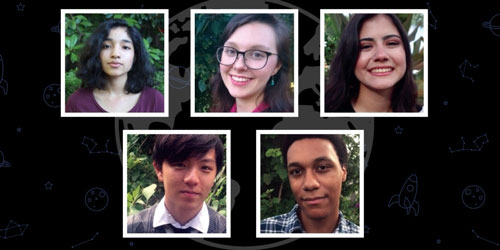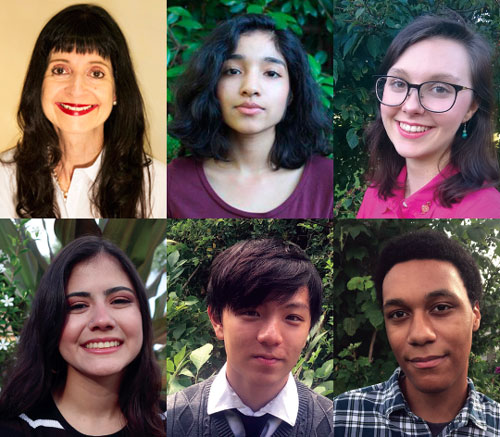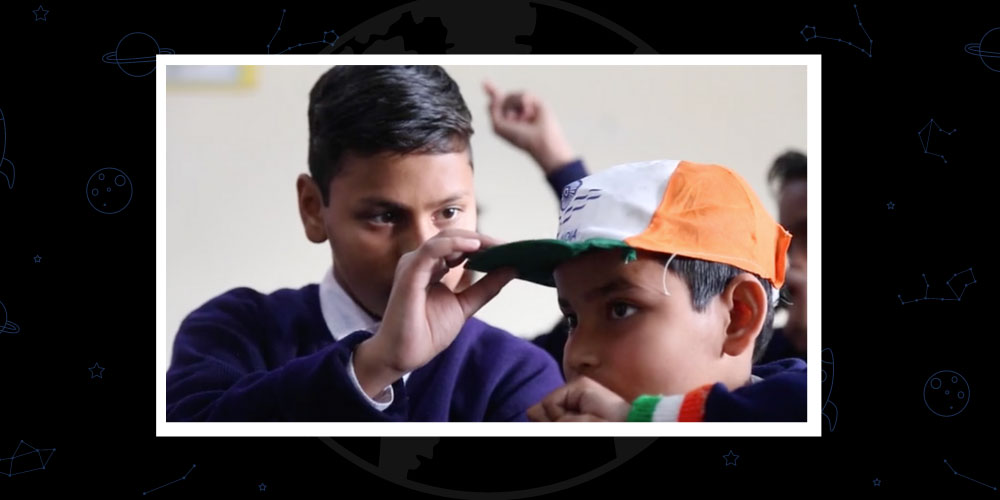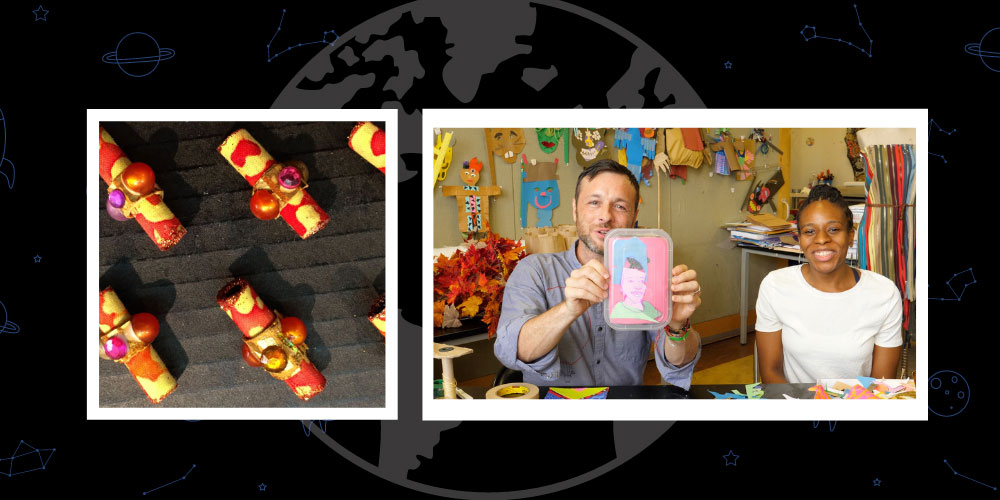Beginning this month on the Planet Classroom Network YouTube Channel, audiences will be able to listen to poetry readings by Manasi Garg, Maddy Dietz, Isabella Ramirez, Ethan Wang, and Anthony John Wiles, Jr. Representing five geographical regions of the US, these 5 high school students were chosen from thousands of award-winning poets to serve for 1 year as the 2020 Class of National Student Poets. It is the United States’ highest honor for youth poets presenting original work.
In the 5 videos presented on the Planet Classroom Network YouTube Channel (curated for Planet Classroom by the Alliance for Young Artists & Writers/Scholastic Art & Writing Awards), each of the poets will present their work that responds to unprecedented times in their own inimitable ways. Today, The Global Search for Education has asked Manasi, Maddy, Isabella, Ethan and Anthony to tell us in their own words what inspired each of their remarkable poems, and also what they hope audiences will take away from their art.
Manasi, you are from California and you are the National Student Poet of the West. Tell us what inspired you to write your poem, “For Tamir Rice.”
I don’t really write for an audience or for other people. I don’t want any reader to feel like they have to interpret one of my pieces in a specific way, but obviously when I write, pieces of me do come out through the words and part of that, in a subtle way, will be my own political beliefs. I really hope that my poems will just help people think about the world and about issues in a more empathetic, humane, and nuanced way. “For Tamir Rice” is a poem in honor of a victim of police brutality, a child named Tamir Rice. The abstract concept behind the piece might have been me critiquing police brutality and systemic racism but the content of the piece is really just talking about Tamir himself. I think in the media, a lot of people of color, especially black people, are so de-humanized and people are so desensitized to violence against black lives, and so to me it was really important to make sure that when you read the poem you get the full sense for Tamir. He was just another boy just like the rest of us. He was a person with an incredible life and interests and a family who loved him. I just wanted people to care more about that side of the story instead of the narrative always being about “ oh he was shot, he was killed.” I wanted the narrative to be about what an incredible person he was, and more importantly, he was a human with a valuable life.
Maddy, you are from Minnesota and you are the National Student Poet for the Midwest. Tell us what inspired you to write your poem, “Abridged Drinkers Dictionary”?
My poem, “Abridged Drinkers Dictionary,” was written to confront the normalization of alcohol abuse, especially during quarantine. I wrote it because, when faced with experiences I don’t know how to talk about, I write instead. I come from a long long line of alcoholics and I wanted to show how pervasive that culture is, how easy it is to ignore said culture and how love can exist despite addiction. I hope that “Abridged Drinkers Dictionary” encourages people to interrogate their own family’s history with addiction no matter what that addiction may be. And I hope it allows people to understand that love and grief and even anger are not mutually exclusive emotions.
Ethan, you are from Texas and you are the National Student Poet for the Southwest. Tell us what inspired you to write your poem, “Cloth Ballad, Leather Trails.”
I was inspired to write “Cloth Ballad, Leather Trails” mostly through the experiences I had in the pandemic. Obviously, there’s a lot of stress and a lot of emotions that built up over this time period. As I was thinking about things, not necessarily writing for awhile, and I wanted to express all that, and there’s also a few of these personal issues and family events that are kind of embroiled in it. So those are embedded into the poem as well.
I hope the poem can continue to further along the kind of ongoing reflection that’s already kind of happening about the pandemic. What’s going to happen in the future and what it’s like for people now. And I think that the thing about writing I do a lot is that even just reading writing that relates to your current situation or what’s happening to you now can make you feel better just knowing that other people are experiencing something like that, and I hope that my poem does basically the same or something similar for other people.
Isabella, you are from Florida and you are the National Student Poet for the Southeast. Tell us what inspired you to write your poem, “The Andes Speak of Death and 2020, Told in Two Hemispheres.”
My poetry is largely inspired by my personal experiences and how they’re shaped by my identities. Specifically, my poem, “The Andes Speak of Death and 2020, Told in Two Hemispheres,” is an exploration of the grief I faced in the pandemic. It takes the two worlds I exist in at the intersection of my heritage in Ecuador and my life in America, and parallels the two to create a timeline of my stories around death; a reflection of what’s unfortunately been at the forefront of many people’s minds in the present. With my poetry, I always hoped to challenge others to explore new perspectives, especially those of youth. I hope that my poem will inspire people to think about the impact the pandemic has had on our youth, not only in the obvious ways, physically and financially, but socially and emotionally as well. I think many, old or young, resonate with the feelings I express in my poem. And I hope to further people’s empathy and compassion for others.
Anthony, you are from Pennsylvania and you are National Student Poet for the Northeast. Tell us what inspired you to write your poem “Amerikkkan Dreaming: Finding Freedom in Vietnam.”
I was inspired to write my poem, “Amerikkkan Dreaming: Finding Freedom in Vietnam,” after the killings of George Floyd and Breonna Taylor. I was personally fed up with the continuous murders committed against my people, and having to be exposed to them in almost every aspect of my daily life, especially from social media. As I watched the political and racial divisions in my own nation and in my own community continue to grow, I personally tried to look to other nations where I could see a future for myself, and I could see one where I would be free, and the color of my skin would not be a barrier to my right to breathe. In my research, I found that in Vietnam, along with a bunch of other nations, that for the most part, Black people were treated as human beings, which is more than I can say about this country currently. And to me, this poem is a plea for help and a plea for freedom, and it’s a cry to be seen and to be treated as a human being, and to have your life respected. And, I just want to be treated as a human being in the only place that I’ve ever known, the only place that I’ve ever called home, which is the United States of America.
C. M. Rubin with Manasi Garg, Maddy Dietz, Isabella Ramirez, Ethan Wang, and Anthony John Wiles, Jr.
Audiences can screen readings by the 2020 National Student Poets beginning this month on the Planet Classroom Network YouTube Channel. These videos featuring the National Poets are curated for Planet Classroom by the Alliance for Young Artists & Writers/Scholastic Art & Writing Awards.







Recent Comments